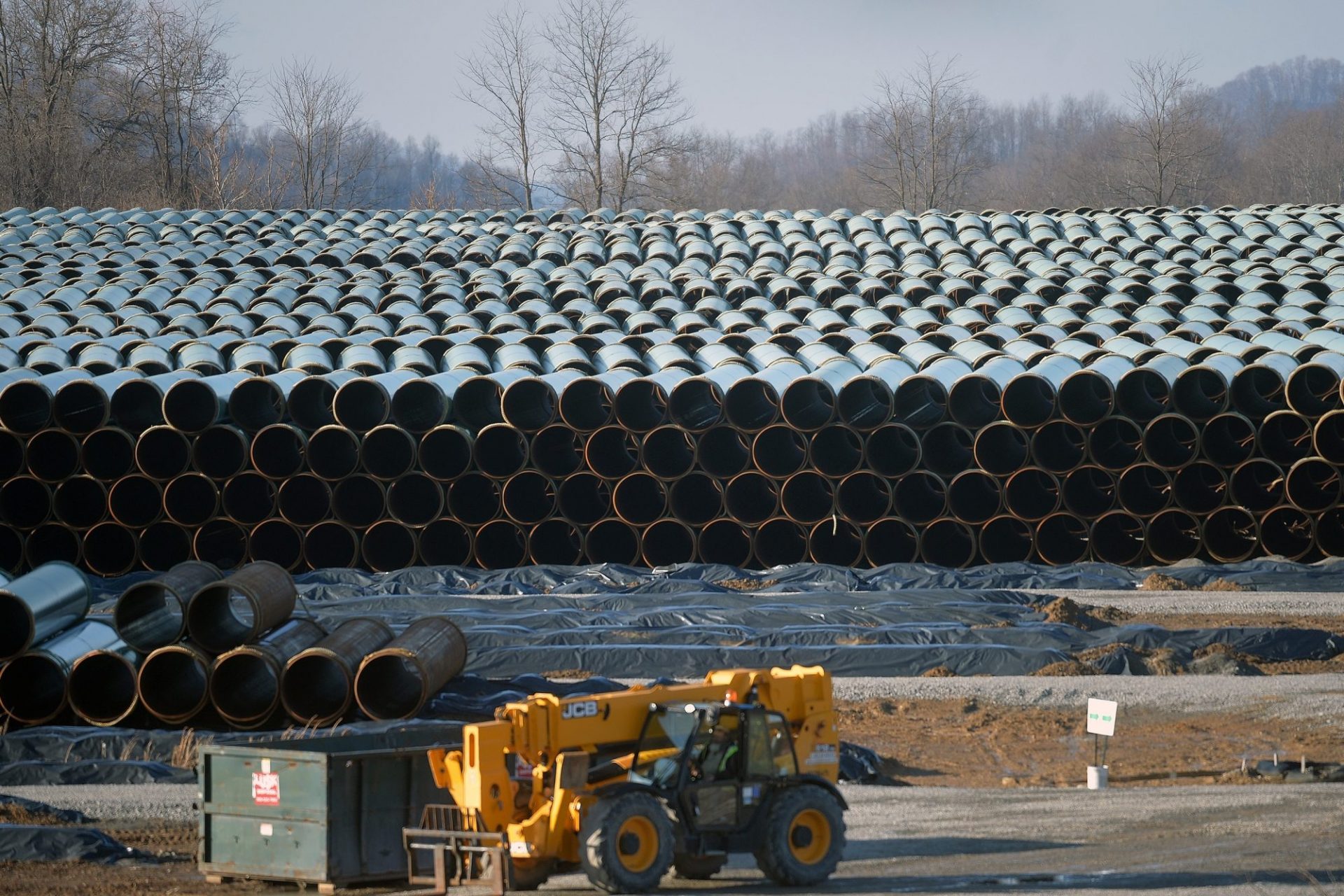
A sign warns drivers of natural gas pipeline construction ahead.
Marie Cusick / StateImpact Pennsylvania


A sign warns drivers of natural gas pipeline construction ahead.
Marie Cusick / StateImpact Pennsylvania

Marie Cusick / StateImpact Pennsylvania
A sign warns drivers of natural gas pipeline construction ahead.

F. Brian Ferguson / Charleston Gazette-Mail
Along U.S. Route 19 in southern West Virginia, row after row of pipe is stockpiled in preparation for construction of the 300-mile Mountain Valley Pipeline, one of several major natural gas pipelines that will crisscross the state as the industry booms.
The D.C. Circuit Court of Appeals has tossed a case brought by environmentalists that charged the Federal Energy Regulatory Commission with bias in pipeline cases.
The Delaware Riverkeeper Network filed a federal lawsuit in 2016, alleging FERC favored industry in disputed pipeline cases.
The lawsuit, brought by the organization and its director, Maya van Rossum, asserted that FERC is incapable of making objective decisions regarding pipeline projects because its funding, set by Congress, is recovered by fees imposed on the industries it regulates, including pipeline companies. DRN argued that “the Commission is insulated from Congressional budgetary oversight,” and therefore deprives individuals opposed to new pipelines of their 5th Amendment right to due process.
The three-judge panel rejected that argument and upheld a lower court’s decision, saying FERC’s pipeline approvals are not tied to its budget.
DRN also argued that FERC approves all pipeline projects that come before it, fails to enforce terms and conditions of its certificates, and issues “tolling orders” that allow construction of pipelines despite appeals of the agency’s decisions that leave challengers in “legal limbo.”
Although the federal Natural Gas Act requires the agency to issue a decision on appeals within 30 days, FERC can extend the deadline indefinitely by issuing a “tolling order.” Meanwhile, construction can continue.
The court affirmed its previous decisions, saying the Natural Gas Act allows for the practice, and stating this case did not challenge a particular tolling order.
“To prevail on its claim here, Riverkeeper would need to show that FERC’s statutorily authorized practice of taking more than 30 days to finally dispose of a rehearing petition violates due process in each and every instance, no matter the reasons for taking more time, the complexity of the application, or the amount of development allowed or blocked in the interim. The Constitution imposes no such categorical rule, and Riverkeeper makes no serious effort to contend otherwise.”
The Delaware Riverkeeper Network criticized the decision. In a statement, it said FERC’s bias is “self-evident.”
“Today the DC Circuit found that a federal agency that is entirely and fully funded by the very industry that it regulates is an acceptable way to fund the agency,” said Aaron Stemplewicz, senior attorney at the Delaware Riverkeeper Network. “Despite the fact that FERC has a near 100% approval rate for the pipeline projects that provide the basis for its funding, the Court nevertheless did not find sufficient evidence of bias.”
The federal court also rejected DRN’s arguments related to Pennsylvania’s Environmental Rights Amendment, saying it does not constitute rights protected by the U.S. Constitution.
StateImpact Pennsylvania is a collaboration among WITF, WHYY, and the Allegheny Front. Reporters Reid Frazier, Rachel McDevitt and Susan Phillips cover the commonwealth’s energy economy. Read their reports on this site, and hear them on public radio stations across Pennsylvania.
(listed by story count)
StateImpact Pennsylvania is a collaboration among WITF, WHYY, and the Allegheny Front. Reporters Reid Frazier, Rachel McDevitt and Susan Phillips cover the commonwealth’s energy economy. Read their reports on this site, and hear them on public radio stations across Pennsylvania.
Climate Solutions, a collaboration of news organizations, educational institutions and a theater company, uses engagement, education and storytelling to help central Pennsylvanians toward climate change literacy, resilience and adaptation. Our work will amplify how people are finding solutions to the challenges presented by a warming world.